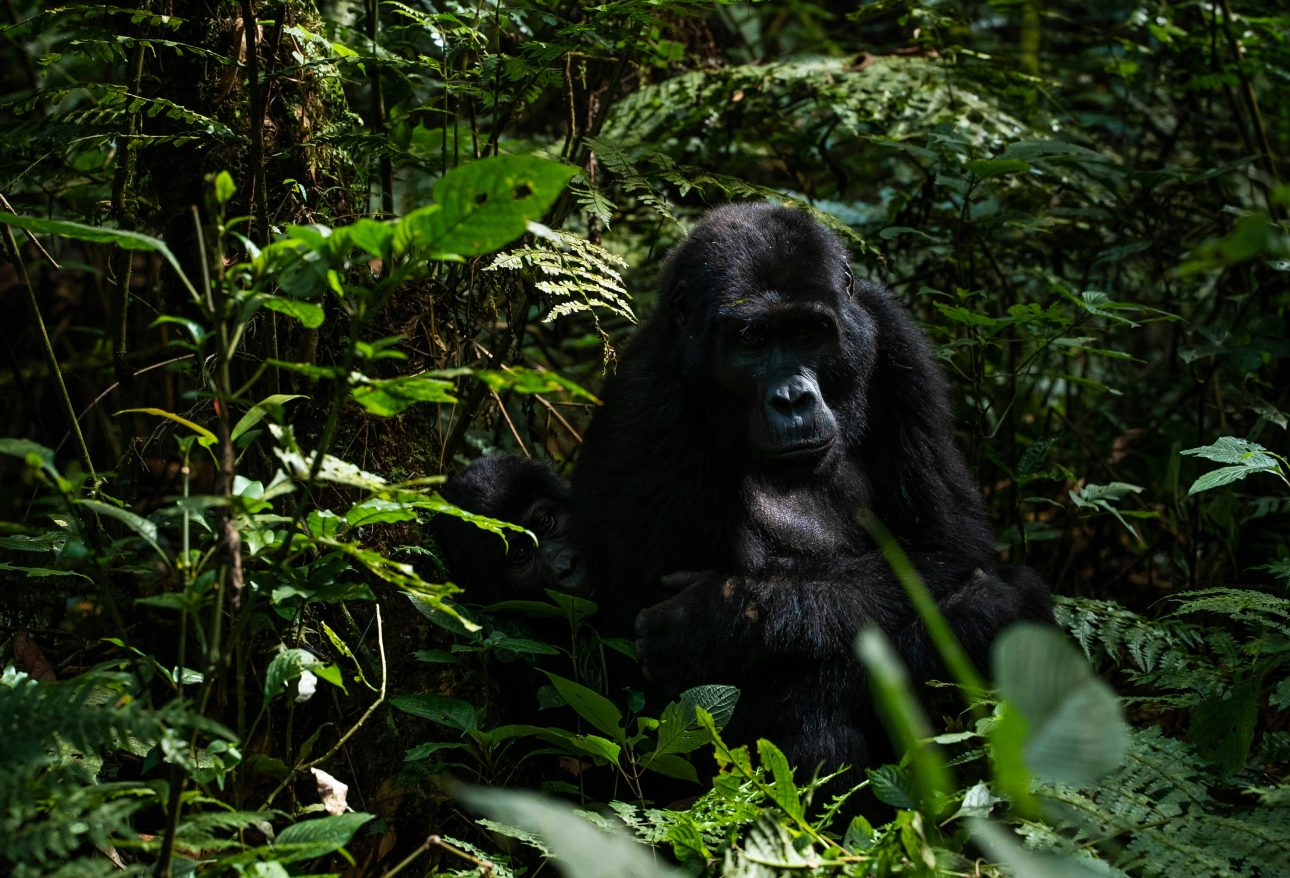Both Uganda and Rwanda offer extraordinary mountain gorilla trekking experiences that rank among the world’s most sought after wildlife encounters, but understanding the key differences between these destinations helps travelers make informed decisions that align with their preferences, budgets, and adventure goals. Each country provides unique advantages and characteristics that appeal to different types of travelers, from budget conscious adventurers to luxury seekers prioritizing convenience and accessibility.
Uganda: The Budget Friendly Gorilla Capital
Uganda’s Bwindi Impenetrable National Park stands as the undisputed gorilla trekking champion in terms of variety, value, and overall experience diversity. Home to approximately half of the world’s remaining mountain gorillas, Bwindi hosts an impressive 19 habituated gorilla families spread across four distinct sectors: Buhoma, Ruhija, Rushaga, and Nkuringo. This abundance translates into significantly more trekking opportunities, with 152 daily permits available compared to Rwanda’s 96, making Uganda an excellent choice for travelers seeking flexibility in booking dates and group preferences.
The economic advantage of choosing Uganda becomes immediately apparent when comparing permit costs. At approximately 700 USD per person, Uganda’s gorilla permits cost less than half of Rwanda’s 1,500 USD permits, representing substantial savings that budget conscious travelers can redirect toward extending their stay, upgrading accommodations, or adding complementary activities. This price difference often allows visitors to experience gorilla trekking multiple times or bring family members who might otherwise be priced out of this once in a lifetime opportunity.
Beyond the financial benefits, Uganda’s diverse ecosystems surrounding Bwindi create opportunities for comprehensive wildlife experiences that extend far beyond gorilla encounters. The country’s strategic location allows travelers to combine gorilla trekking with classic African safari experiences in renowned parks like Queen Elizabeth National Park, famous for its tree climbing lions and diverse ecosystems, or Murchison Falls National Park, where the mighty Nile creates spectacular waterfalls and supports abundant wildlife populations including elephants, giraffes, and hippos.
Rwanda: Accessibility and Luxury Excellence
Rwanda’s Volcanoes National Park offers unmatched accessibility and convenience that appeals particularly to travelers with limited time or those prioritizing comfort and ease of travel. Located just two to three hours by road from Kigali’s international airport, the park eliminates the longer transfer times required to reach Uganda’s gorilla trekking sites. This proximity makes Rwanda ideal for short getaway trips, business travelers with limited vacation time, or visitors who prefer to minimize travel fatigue before embarking on physically demanding trekking activities.
The Rwandan approach to gorilla tourism emphasizes luxury and premium service delivery, with world class accommodations, professional guide services, and meticulously managed trekking experiences that cater to visitors expecting high end service standards. The country’s commitment to conservation excellence and tourism professionalism has earned international recognition, making it a preferred choice for luxury travelers and those seeking seamlessly orchestrated wildlife experiences.
Rwanda’s smaller size and focused approach to gorilla tourism creates more predictable and standardized experiences, with eight habituated gorilla groups providing consistent encounter opportunities. The volcanic landscape of the Virunga Mountains offers dramatically different scenery compared to Bwindi’s dense forests, featuring open bamboo forests and spectacular mountain vistas that appeal to photographers and travelers seeking diverse African landscapes.
Trekking Experience Variations
The actual gorilla trekking experiences in both countries share fundamental similarities while offering distinct characteristics that influence visitor satisfaction and preference. Uganda’s Bwindi Impenetrable Forest lives up to its name, providing dense jungle encounters where gorillas often appear suddenly through thick vegetation, creating intimate and sometimes surprising meetings that feel genuinely wild and unpredictable. The forest’s complexity means trekking times can vary dramatically, from 30 minutes to eight hours, depending on gorilla movement patterns and seasonal factors.
Rwanda’s volcanic terrain typically offers more predictable trekking conditions with clearer pathways and generally shorter hiking times, making it more accessible for travelers with physical limitations or concerns about endurance requirements. The bamboo forest environment provides excellent photographic opportunities with better lighting conditions and more open spaces that facilitate group viewing and photography.
Both destinations limit groups to eight visitors per gorilla family per day and enforce the same one hour viewing restriction once gorillas are located. Professional guides in both countries possess extensive knowledge of gorilla behavior, forest ecosystems, and safety protocols, ensuring memorable and educational experiences regardless of destination choice.
Comprehensive Safari Integration
Uganda’s significant advantage lies in its ability to provide comprehensive African safari experiences that combine gorilla trekking with traditional big game viewing, cultural encounters, and adventure activities. Travelers can design itineraries that include the Big Five game viewing in Queen Elizabeth National Park, chimpanzee trekking in Kibale Forest, white water rafting at the Source of the Nile in Jinja, and cultural experiences with indigenous communities like the Batwa pygmies.
This diversity makes Uganda particularly appealing for first time visitors to East Africa who want to maximize their wildlife experiences within a single destination. The country’s extensive national park system, diverse ecosystems, and well developed tourism infrastructure support multi week adventures that showcase the full spectrum of African wildlife and cultural heritage.
Rwanda’s more limited safari options focus primarily on gorilla trekking supplemented by golden monkey tracking, cultural experiences, and scenic touring. While these experiences are excellent in quality, travelers seeking comprehensive wildlife safaris often combine Rwanda with neighboring countries like Tanzania or Kenya to achieve their safari goals.
Accommodation and Service Standards
Both destinations offer accommodation options ranging from budget camping to ultra luxury lodges, but with different approaches and price points. Uganda’s accommodation scene provides excellent value across all categories, with quality lodges and camps offering comfortable amenities at prices that allow budget conscious travelers to enjoy higher standards than their budgets might typically permit.
Rwanda’s accommodation tends toward the premium end of the market, with world class luxury lodges that command correspondingly high rates but deliver exceptional service, cuisine, and amenities that justify the investment for travelers prioritizing comfort and luxury. The country’s focus on high value, low impact tourism means fewer but higher quality accommodation options.
Cultural and Community Experiences
Uganda offers more extensive opportunities for authentic cultural interactions, particularly with indigenous communities like the Batwa pygmies who share traditional forest knowledge and cultural practices with visitors. The country’s diverse ethnic composition provides numerous cultural tourism opportunities that complement wildlife experiences and provide deeper insights into local traditions and lifestyles.
Rwanda’s cultural experiences focus heavily on the country’s remarkable recovery and development since the 1994 genocide, with moving memorial sites, community based tourism projects, and encounters with local artisans and farmers. These experiences provide profound insights into resilience, reconciliation, and progress that many visitors find as impactful as wildlife encounters.
Making the Right Choice
The decision between Uganda and Rwanda ultimately depends on individual priorities, budget constraints, and travel preferences. Uganda appeals to budget conscious travelers, safari enthusiasts seeking diverse wildlife experiences, adventure seekers wanting comprehensive African experiences, and visitors with flexible time schedules who can accommodate longer transfer times and potentially extended trekking periods.
Rwanda suits travelers prioritizing convenience and accessibility, luxury seekers willing to pay premium prices for exceptional service, visitors with limited time requiring efficient logistics, and those focusing specifically on gorilla encounters without extensive additional safari requirements.
Both destinations deliver extraordinary gorilla trekking experiences that create lifelong memories and contribute meaningfully to conservation efforts protecting these endangered primates. The choice between them should reflect personal preferences rather than concerns about experience quality, as both countries provide world class gorilla tourism that exceeds visitor expectations and supports crucial conservation initiatives.

